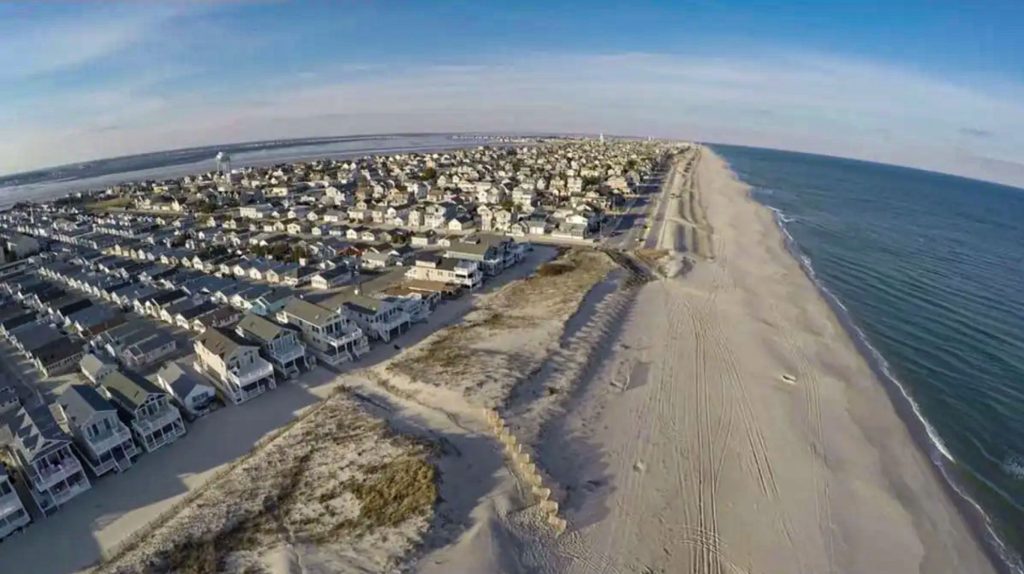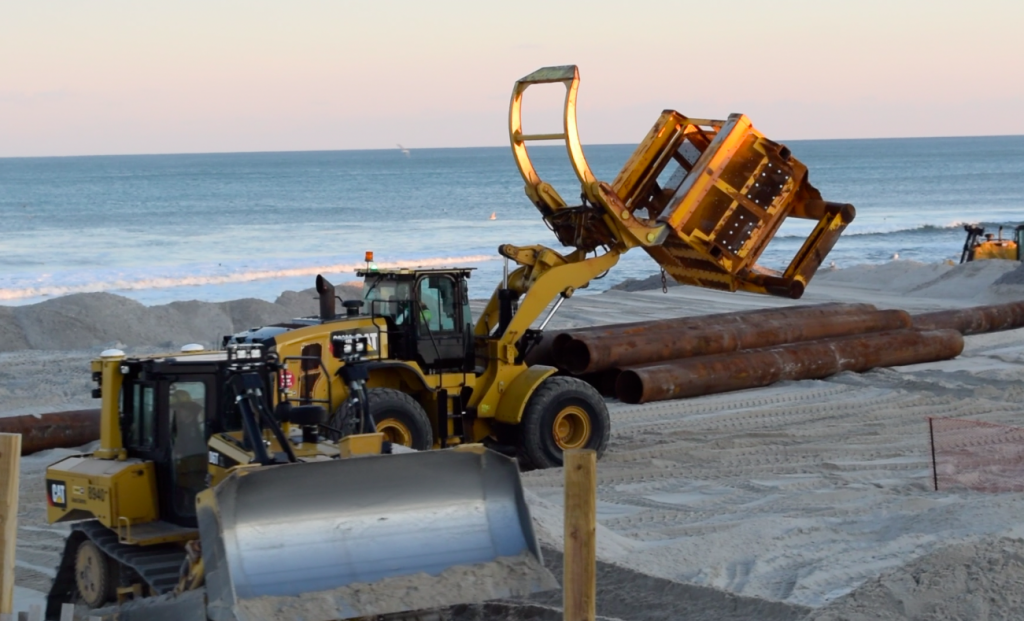An Ocean County jury has upended New Jersey’s long-standing argument against awarding private beachfront homeowners large payouts for refusing to sign easements allowing beach replenishment projects to take place.
Last week, jurors found in favor of the Midway Beach homeowners’ association in South Seaside Park, which had sued the state Department of Environmental Protection over the value of portions of sand taken by eminent domain after the association refused to sign easements allowing beach replenishment work to move forward on what was their property. The jury awarded the association $4.7 million in compensation for the taking, which – if not vacated in an appeal – will ultimately rise since seven years’ worth of interest will be applied to the judgment.
The state has long relied on legal precedent which allows the state to factor in the benefits of the beach replenishment project – protection for the homes behind the dune – when determining the market value of a taking in order to move the project forward. In a landmark decision, the New Jersey Supreme Court had previously ruled that a Harvey Cedars homeowner was not entitled to a “windfall” because they refused to sign an easement, forcing the state to take the parcel of sand in front of their home by eminent domain.
|
|
The Midway Beach case was brought after homeowners claimed they wished to maintain their own dune, and were opposed to the possibility of their private beach being opened to the public in the case of portions being taken by the state. Federal and state officials countered that in order to be effective at preventing breaches during coastal storms, dunes must be engineered uniformly along a lengthy area, and not subject to the whims of individual homeowners who deviate from the larger dune system, or either cannot or will not maintain it in the future.
The verdict in favor of the Midway Beach Condominium Association involved the taking of more than six acres of land owned by the association. The case was heard before Superior Court Judge Valter Must in Toms River.
According to a statement from Midway’s attorneys, the property owned by the private association included a preexisting sand dune and berm storm protection system which was created over the course of decades by Midway, which regularly maintained the storm system by building and renourishing a sand dune which exceeded 25-foot in height and more than 80 feet in width, which is higher and wider than the specifications for the dune to be built by the U.S. Army Corps of Engineers.
Midway, its attorneys argued, also regularly planted dune grass and other vegetation in the dune area and used recycled Christmas trees at the base of the dune to anchor new dune growth. Midway’s property includes nearly 400 single-family homes which are members of the association which owns the land and the beach area. The DEP’s dune project was constructed in 2019 and 2020 in Berkeley Township but, because of the preexisting dune, “did not require any additional work to be performed at Midway,” the statement said.
In the eminent domain case, the state Department of Environmental Protection took the position that Midway was only entitled to a “token” compensation in the amount of $500 based upon the agency’s position that the government project would provide storm protection benefits to the property. Midway disagreed, taking the position that the project would not provide any additional benefits to the property, which already enjoyed significant storm protection as a result of its private efforts to build and maintain the dune barrier. Midway objected to the taking of its property as being unnecessary and arbitrary.
While juries have generally sided with the state’s argument in favor of avoiding paying large sums of money to homeowners or beach associations that refuse to sign easements allowing beach replenishment to be performed by the federal government, they are not necessarily beholden to that position, and can choose to favor the property owner. Politically, oceanfront homeowners have long been the target of beach access advocates as well as many elected officials who oppose efforts to prevent the public from accessing the beach.
Anthony Della Pelle, Esq. of the firm of McKirdy Riskin Olson & DellaPelle, successfully represented Midway in the litigation.
It was not clear as to whether the state would appeal the verdict. A 2019 ruling from the New Jersey Supreme Court reversed a jury award of more than $800,000 to a Harvey Cedars couple who had a small piece of their private dune taken for replenishment work, setting a precedent for the state to mount a case against large awards for property owners. The court held that homeowners could not expect a “windfall” from the local, state or federal governments for a project that arguably added value to their properties.
Della Pelle said that the jury’s verdict was “a bittersweet victory,” because the association had always wanted to provide its own storm protection as it had done in the past, but since it was unsuccessful in stopping the taking of its property, the association was satisfied that the jury verdict recognized that the state had to “pay for what it took” from Midway.
Della Pelle has represented numerous New jersey beachfront property owners whose property was taken by the state after Hurricane Sandy. The property owners, most notably those in Bay Head, argued they were capable of providing their own storm protection and did not want to be forced to count on the government to build and maintain protective dunes.
The verdict comes, ironically, as a two-year delay in beach renourishment has bolstered the case of the homeowners’ argument. This week, the Army Corps confirmed to Shorebeat that they had received a new tranche of bids for a dune maintenance project on Ocean County’s northern barrier island after several rounds of proposals that came in over budget and were subject to protests under federal defense procurement policies.

Advertisement

Police, Fire & Courts
Grand Jury Indicts Point Pleasant Man, Once a Fugitive, for Attempted Murder










